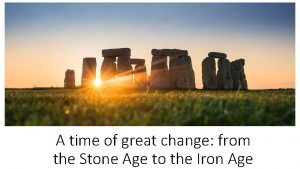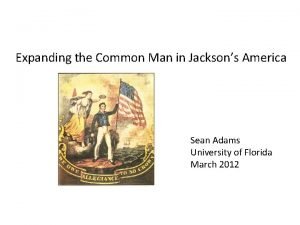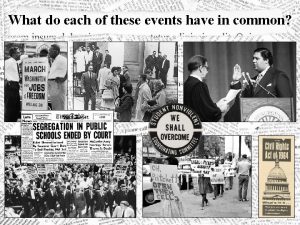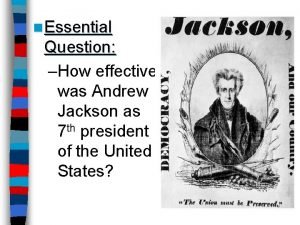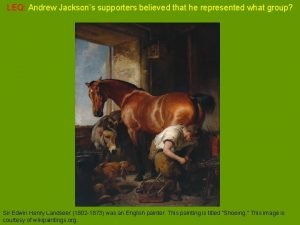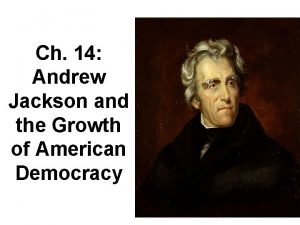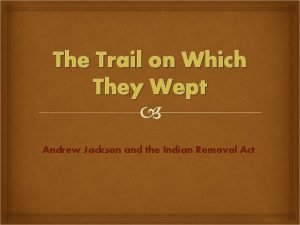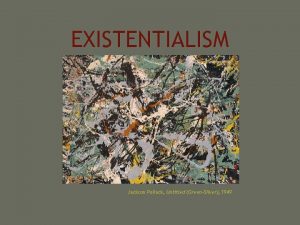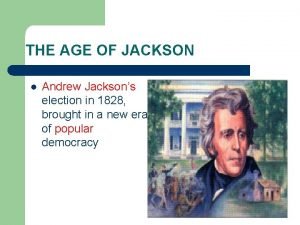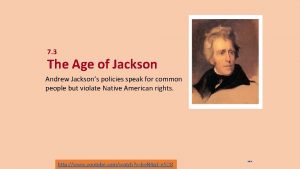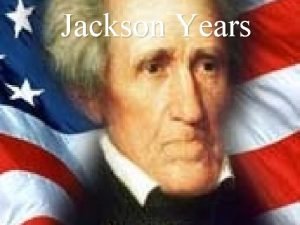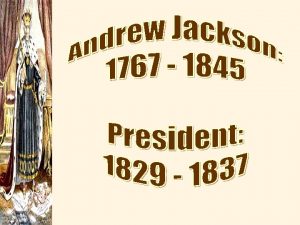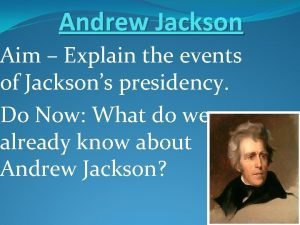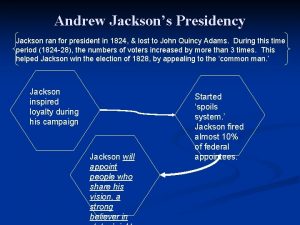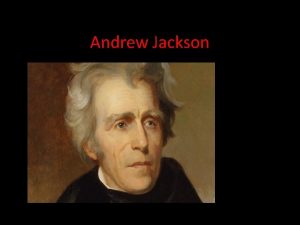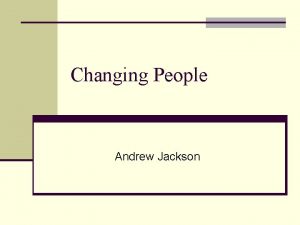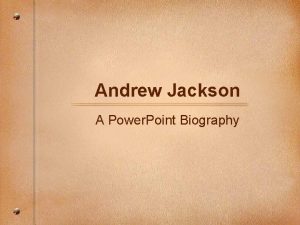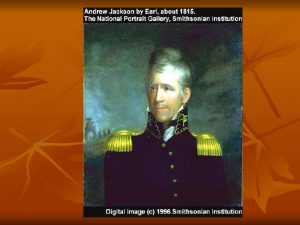THE AGE OF JACKSON l Andrew Jacksons election
















- Slides: 16

THE AGE OF JACKSON l Andrew Jackson’s election in 1828, brought in a new era of popular democracy

Andrew Jackson: Hero or Villain? l l l l Born in 1767 in NC Orphaned at 13 – no formal education Emotional, Arrogant and Passionate always ready to duel Defeated the Creeks at Horseshoe Bend in 1814 & the British at New Orleans in 1815 Took Florida and Claimed it for the US in 1819 Loved by his soldiers who called him “Old Hickory” Distrusted the rich and powerful

Andrew Jackson John Quincy Adams

The Election of 1824: “The Corrupt Bargain” l l l Jackson ran in a 4 -way race for Pres in 1824 (all the same party!) Even though Jackson won the popular vote, he didn’t receive a majority of electoral votes. Henry Clay gives his support to JQ Adams and the House of Reps chooses Adams as President Adams names Clay Sec. of State 2 weeks later…. hmmmm AJ is furious: The Corrupt Bargain AJ Publicly supports changes in state laws about who can vote

Andrew Jackson John Quincy Adams

Result: 3 times as many people vote & Andrew Jackson wins

ELECTION OF ANDREW JACKSON l l Jackson, hero of the common man, won election in 1828 in part because the right to vote had been expanded to more citizens In the 1824 election, won by John Quincy Adams, 350, 000 white males voted In 1828, over 1, 000 white males voted in the nastiest campaign ever. Many of the new voters supported Jackson who also won re-election in 1832

JACKSONIAN DEMOCRACY l l l As part of his political philosophy, Jackson sought to grant political power to the common people: Age of the Common Man Jackson rewarded his own supporters with government jobs. This is called The Spoils System. Jackson gave away many jobs to his friends and political allies and fired the rich and powerful elites.

“The age of the common man” was characterized by l l heightened emphasis on equality in the political process for adult white males (rich white guys) the rise of interest group politics and sectional issues a changing style of campaigning – political parties tried to appeal to “folks” (free food, ads, campaigns) increased voter participation. Politics started to look like what we know today. Do you think these changes were good or bad for the nation?

INDIAN REMOVAL ACT - 1830 l Jackson’s Native American Policy – – – l l Indian Removal Act of 1830 – Forced resettlement of Native Americans (Cherokee and others) from their homes in the SE to Oklahoma and lands west of the Mississippi River Bureau of Indian Affairs created to oversee resettlement Many forced onto reservations The Cherokee claimed the relocation was wrong and it went to the supreme court. Marshall ruled in favor of the Cherokee Tribe. Jackson’s response – “Marshall has made his decision, now let him enforce it”

INDIAN REMOVAL - 1830

l Forced relocation of the Cherokee tribe was called The Trail of Tears. Before the journey was over ¼ of the tribe perished. – Reflected Jackson’s personal apathy toward Native Americans (he didn’t care)

TARIFF OF “ABOMINATION” l THE NORTH THE SOUTH TARIFFS l In 1824 and again in 1828, Congress increased the Import Tariff Southerners called the 1828 Tariff, “a Tariff of Abominations, ” and blamed it for economic problems in the South

NULLIFICATION THREAT l l l In an attempt to avoid paying the tariff, John Calhoun (Jackson’s Vice Pres from S. C. ), developed the Theory of Nullification South Carolinians argued that states could nullify the Tariff of 1832 and other acts of Congress if they found them to be unconstitutional. Nullification would make the law void within the state. Jackson threatened to send federal troops to SC Haven’t we heard this before?

JACKSON’S BANK WAR l l l Jackson opposed the National Bank – run by the rich and powerful. He vetoed its charter and withdrew all the federal $$. He created Pet Banks run by Dems and his friends Many felt Jackson was acting more like a King than a president His opponents formed a new party – the Whigs Pet Banks led to depression

Jackson’s Legacy: Hero or Villain? The GOOD More democratic involvement in Government Looked out for the interests of the common man Strong Executive Power Massive Voter Turnout Sparked Re-Creation of 2 Party System The BAD The Spoils System Banking Policy causes a Depression Ignores the Supreme Court Greater Sectionalism –Result of Split with States’ Rights (SC) The UGLY Native American Policy Trail of Tears Strong Slavery supporter
 Iron age bronze age stone age timeline
Iron age bronze age stone age timeline Iron age bronze age stone age timeline
Iron age bronze age stone age timeline Antalgic lean
Antalgic lean Jacksons of kingfisher
Jacksons of kingfisher Results of jacksons bank war
Results of jacksons bank war Coffin spring indication
Coffin spring indication Quotes about the trail of tears
Quotes about the trail of tears Andrew jackson vocabulary
Andrew jackson vocabulary Albany movement
Albany movement Andrew jackson
Andrew jackson Nullify
Nullify Andrew jackson and his supporters believed in apex
Andrew jackson and his supporters believed in apex 1828
1828 Andrew jackson trail of tears map
Andrew jackson trail of tears map To kill a mockingbird allusions chapter 1
To kill a mockingbird allusions chapter 1 Andrew jackson pollack
Andrew jackson pollack Political cartoons andrew jackson
Political cartoons andrew jackson

